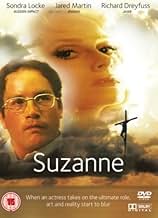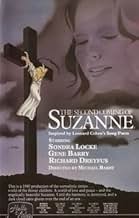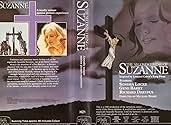Jared Martin plays an aspiring filmmaker obsessed with the idea of Christ as a woman, and tries to film his vision with Sondra Locke as his subject. Supposedly based on a song by Leonard Coh... Read allJared Martin plays an aspiring filmmaker obsessed with the idea of Christ as a woman, and tries to film his vision with Sondra Locke as his subject. Supposedly based on a song by Leonard Cohen, which is used in the film.Jared Martin plays an aspiring filmmaker obsessed with the idea of Christ as a woman, and tries to film his vision with Sondra Locke as his subject. Supposedly based on a song by Leonard Cohen, which is used in the film.
T.G. Sheppard
- John
- (as Bill Browder)
- Director
- Writer
- All cast & crew
- Production, box office & more at IMDbPro
Featured reviews
These quotes are from The Good, The Bad & The Very Ugly; A Hollywood Journey, by Sondra Locke (1997). "The script of his (Barry's) upcoming film had been inspired by Leonard Cohen's haunting song "Suzanne" and was the story of three men- an artist and a director and a newsman- who all love Suzanne and are all changed in some way by her innate goodness and purity. The screenplay was quirky and dreamlike..." (123).
Locke was brave to take part in this abstract vision, and to risk possible injury in the shots captured from a helicopter. She shared her beautiful physical form with the world in two shots with Paul Sand, and these are very special now considering what Locke weathered later on in her personal life.
Instead of simply complaining, do a little research now and then.
Locke was brave to take part in this abstract vision, and to risk possible injury in the shots captured from a helicopter. She shared her beautiful physical form with the world in two shots with Paul Sand, and these are very special now considering what Locke weathered later on in her personal life.
Instead of simply complaining, do a little research now and then.
Richard Dreyfuss is, indeed, in this flick, but in a rather small part. He is NOT the "obsessed" filmmaker - he's the group's business manager/accountant. Even the box describes the film inaccurately. There are no erotic scenes with Sondra Locke, as advertised, unless one uses the term "erotic" quite loosely. I would not have considered viewing the film without Richard Dreyfuss being in it as a major character. I might have, however, had I realized that the famous 60's anthem, Leonard Cohen's "Suzanne," was an artistic influence. Other than the brief recitation of lines from the end of James Joyce's "Ulysses", and an interesting visual reference to the end of Ingmar Bergman's "The Seventh Seal," I found it a poor attempt to meld symbolic elements and moods immortalized in films like "Last Year at Marianbad" and "Un Chien Andalou." If you like the idea of the eccentric artistic troupe, there are many superior films, ranging from "Bye, Bye, Brasil" to "Cecil B. Demented."
I thoroughly enjoyed this film. Remembering that the film was first Proposed in 1970 and came into being in 1974, it is not really the hippy trip some suggest. Caught in the haitus between old and new cinema it attempts to explore the story of the passion through an impressionistic approach. The gender reversals are brave but work in the context of burgeoning feminism. Sandra Locke is as mysterious as she is effective, the three Mary's, here played by men are far more than they appear, and the dialogue whilst sparse is weighty. The production owes a lot to the late sixties populist style of say the Beatles films but also points forward to the work of Derek Jarman and Peter Greenaway. It is a shame that these early 70s films are judged on their ( deliberate) failure to conform rather than on their contemporary achievements. The much bigger budget filming of Jesus Christ Superstar, or the tangled rhetoric of Zabriski Point, are more accessible but fail to communicate in the same way that Suzanne does. As an exploration of innocence cynicism and faith I thought it worked well. The second theme behind the film is the nature of film making itself. Director as creator, divine in the created world. When the discussion of the eternity of the soul unfolds the contemporary flirtation with reincarnation is more a reflection of the directors role travelling between the lives he creates, than a simple populist diversion. Naive this might be, pretentious it is not.
I bought this movie off of EBAY, thinking since Sondra Locke and Richard Dreyfuss were in it, it should be good. They were both in it for like 35 seconds. This movie was way too bazaar and weird to follow. I bought it in July, started watching, got bored, and didn't finish it till October. The movie is really boring, and eerie cause EVERYONE in the whole film is obsessed with Sondra looking like a hippie. **** out of 10 stars.
Woefully 'ambitious' low-budget sludge concerns a filmmaker and his hippie troupe involved in the production of a new-fangled religious saga, with a woman cast as Christ. Independently-financed drama, a would-be dream-like parable (apparently inspired by Leonard Cohen's song "Suzanne"), is so meager in budget--and so sloppy in execution--that the results are nearly unintelligible. After a promising start in films, Sondra Locke lost her way as an actress before Clint Eastwood rescued her career; this is the worst movie she ever appeared in (ditto Richard Dreyfuss, looking embarrassed in the small role of a production associate). Writer-director Michael Barry openly apes Bergman and Antonioni, but he either needed more finance to expand on his (ahem) poetic leanings to bring this picture off or he simply had to be told "No!" The finale, wrong-headed and ridiculously bizarre, strains for "meaning", while the threadbare budget hampers any chance the actors have of sustaining interest. NO STARS from ****
Did you know
- TriviaPrincipal photography was originally set to start September 1, 1971, but was delayed until the following summer. Filming began July 31, 1972 in San Francisco and surrounding areas, and lasted six or eight weeks. But it wasn't released until 1974.
- ConnectionsSpoofed in What About Bob? (1991)
- SoundtracksSuzanne
Written and Performed by Leonard Cohen
- How long is The Second Coming of Suzanne?Powered by Alexa
Details
- Release date
- Country of origin
- Language
- Also known as
- La reencarnación de Suzanne
- Filming locations
- Production company
- See more company credits at IMDbPro
Contribute to this page
Suggest an edit or add missing content

























